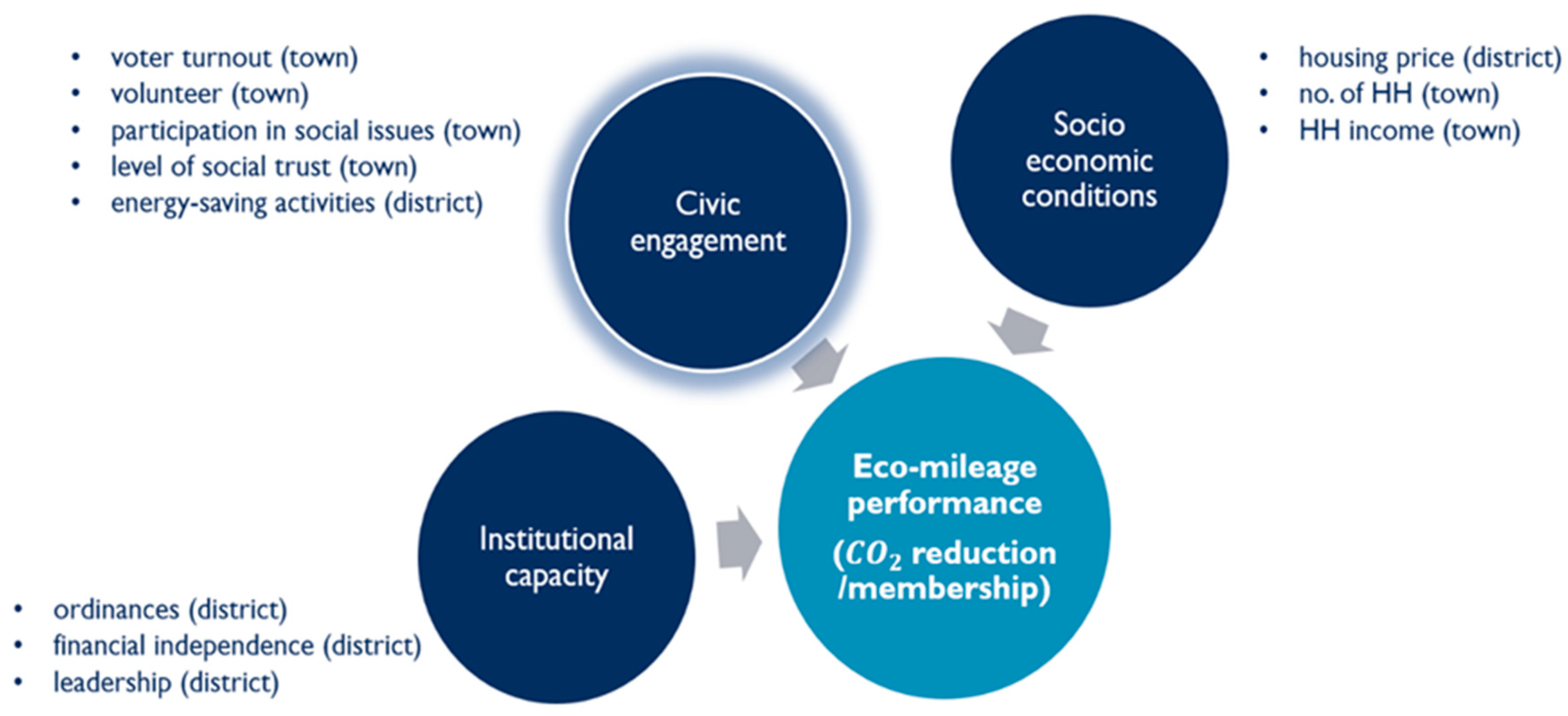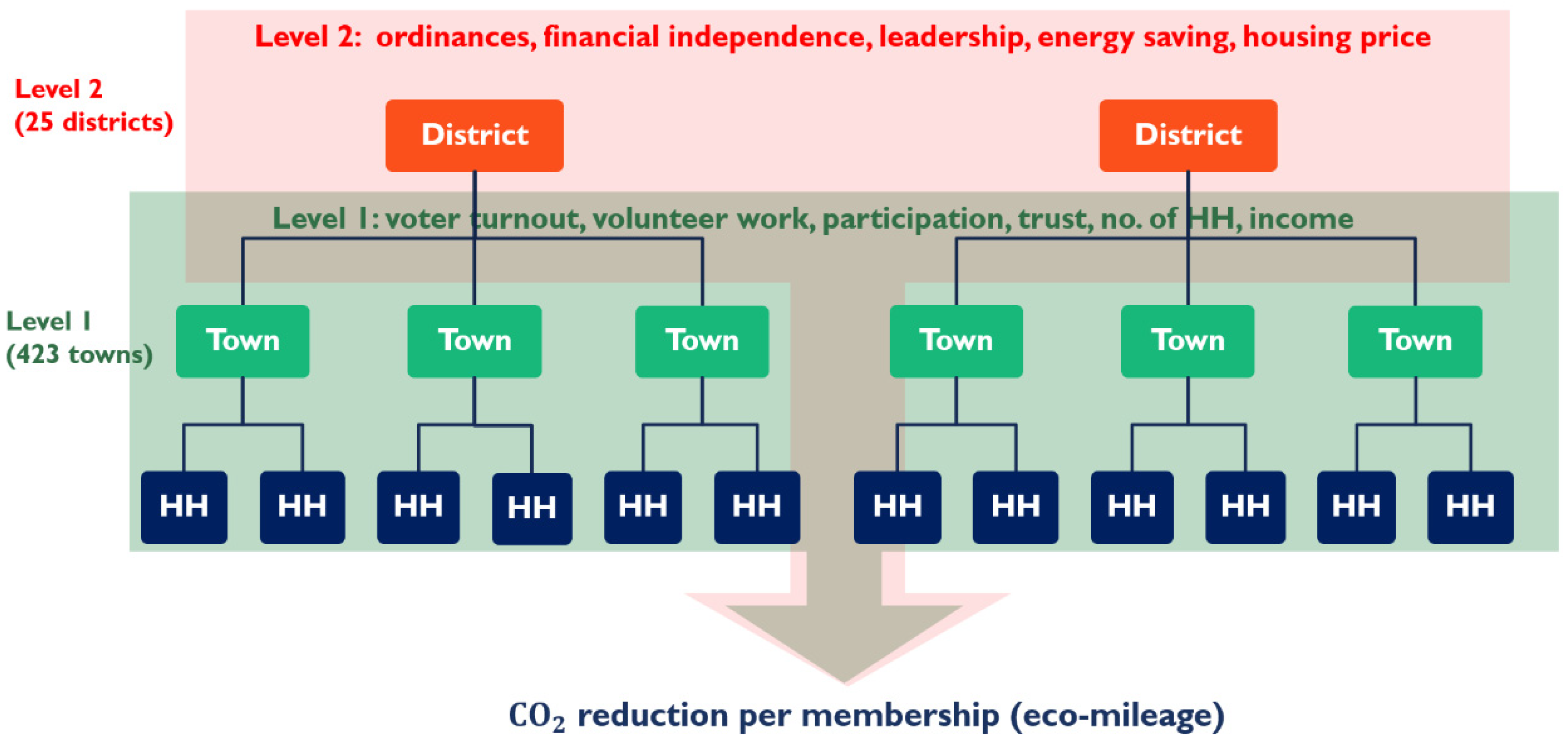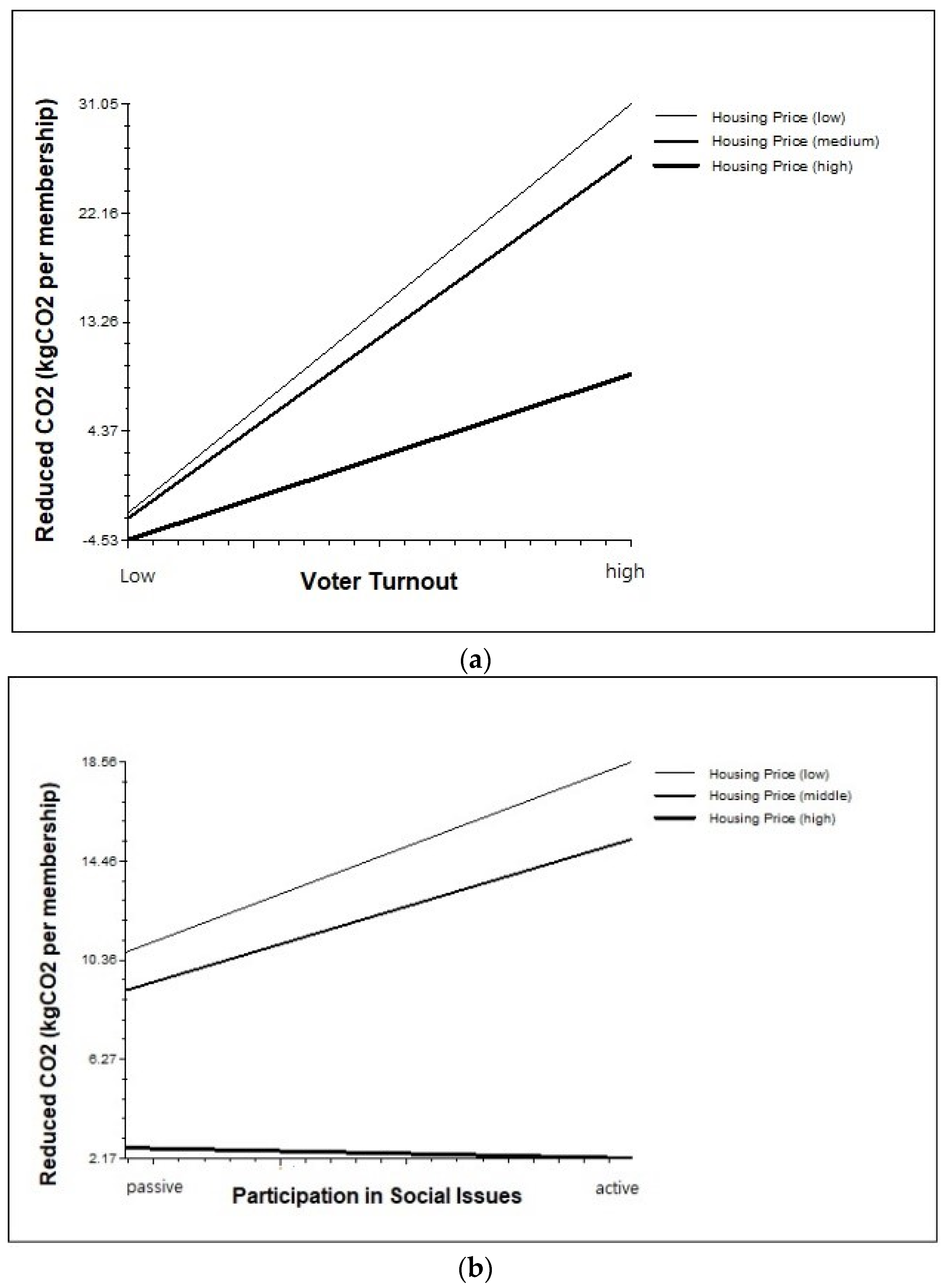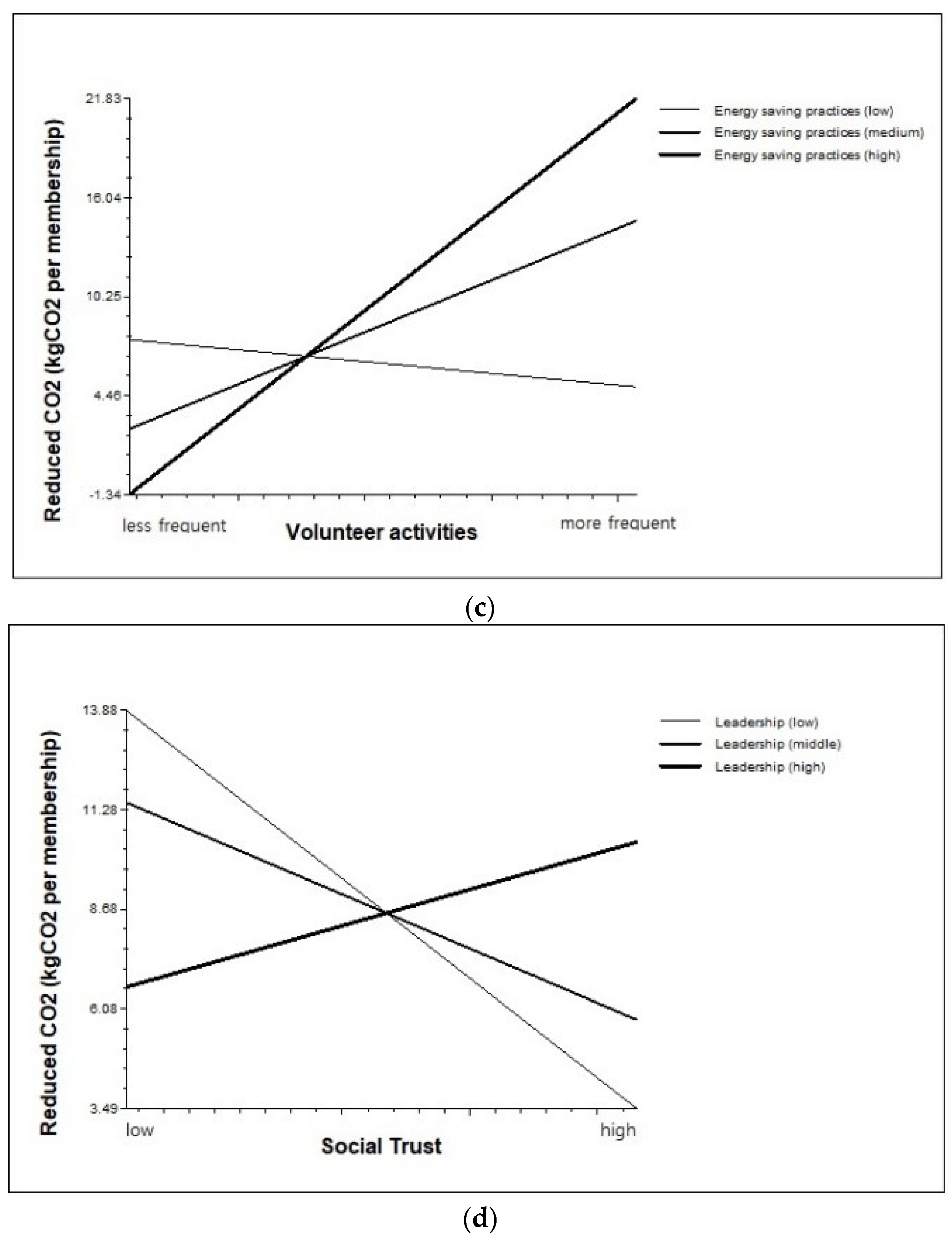Multilevel Analysis of Civic Engagement and Effectiveness of Energy Transition Policy in Seoul: The Seoul Eco-Mileage Program
Abstract
1. Introduction
1.1. Background
1.2. Research Questions and Flow
2. Theoretical Background
2.1. Literature Review
2.2. Research Framework
3. Case and Data
3.1. Seoul Eco-Mileage Program
3.2. Data Collection and Variables
4. Analysis and Discussion
4.1. Random Coefficient Multilevel Model: Estimating the Base Model
4.2. Random Coefficient Multilevel Model: Estimating the Study Model
4.3. Discussion
5. Conclusions
Author Contributions
Funding
Conflicts of Interest
References
- Interagency Committee: Revised Plan of the 2030 Greenhouse Gas Roadmap. Korean Government: Sejong, Korea, 24 July 2018. Available online: https://www.gov.kr/portal/ntnadmNews/1540853 (accessed on 20 January 2019). (In Korean)
- UNFCCC. Report of the Conference of Parties on Its Twenty-First Session: 2015 Nov 30–Dec 11; UNFCCC: Paris, France, 2015; pp. 1–32. Available online: https://unfccc.int/resource/docs/2015/cop21/eng/l09r01.pdf (accessed on 20 January 2019).
- Jung, T.; Park, C. Estimation of the cost of greenhouse gas reduction in Korea under the global scenario of 1.5 °C temperature increase. Carbon Manag. 2018, 9, 503–513. [Google Scholar] [CrossRef]
- Hamilton, J.; Mayne, R.; Parag, Y.; Bergman, N. Scaling up local carbon action: The role of partnerships, networks and policy. Carbon Manag. 2014, 5, 463–476. [Google Scholar] [CrossRef]
- Lee, T.; Lee, T.; Lee, Y. An experiment for urban energy autonomy in Seoul: The One ‘Less’ Nuclear Power Plant policy. Energy Policy 2014, 74, 311–318. [Google Scholar] [CrossRef]
- Seoul Metropolitan Government. Seoul One Less Nuclear Power Plant 2012; SMG: Seoul, Korea, 2013. Available online: https://seoulsolution.kr/sites/default/files/policy/%EC%9B%90%EC%A0%84%ED%95%98%EB%82%98%EC%A4%84%EC%9D%B4%EA%B8%B0%EC%84%B1%EA%B3%BC%EB%B3%B4%EA%B3%A0%EC%84%9C%202012.pdf (accessed on 20 January 2019).
- 2014 Energy Consumption Survey. Korea Energy Economics Institute: Ulsan, Korea, 2015. Available online: http://www.keei.re.kr/main.nsf/index.html?open&p=%2Fweb_keei%2Fd_results.nsf%2F0%2F713FE19414EF957849257E980032A53C&s=%3FOpenDocument%26is_popup%3D1 (accessed on 26 October 2020). (In Korean).
- Moran, D.; Kanemoto, K.; Jiborn, M.; Wood, R.; Tobben, J.; Seto, K.C. Carbon footprints of 13,000 cities. Environ. Res. Lett. 2018, 13, 1–9. [Google Scholar] [CrossRef]
- Ahn, J.; Lee, T. An Analysis of Energy Transition: Focusing on Seoul’s One Less Nuclear Powerplant Policy. ECO 2016, 20, 105–141. [Google Scholar]
- Seoul One Less Nuclear Power Plant Portal. SMG: Seoul, Korea. Available online: http://energy.seoul.go.kr/eng/main/main.do (accessed on 4 April 2019).
- Lee, J. An Analysis of Energy Saving Performance of Seoul Energy Self-Sufficiency Villages. Master’s Thesis, Graduate School of Life and Environmental Science, Korea University, Seoul, Korea, 2017. [Google Scholar]
- Lim, S.; Kang, H. Performance evaluation of Seoul’s Eco-Mileage program using the Logic Model. GRI Rev. 2018, 20, 161–182. [Google Scholar]
- Yoo, J.; Yeo, J.; Jo, E. Analysis on the Donation Motivation of Citizens to the Seoul Energy Fund through Eco-Mileage System. Korea Environmental Policy and Administration Society 2017 Fall Conference. 2017, pp. 39–40. Available online: http://www.dbpia.co.kr/pdf/pdfView.do?nodeId=NODE07260957 (accessed on 25 October 2020).
- Ko, Y.; Song, B. Sustainable service design and revenue management for electric tour bus systems: Seoul city tour bus service and the Eco-mileage program. J. Sustain. Tour. 2019, 27, 308–326. [Google Scholar] [CrossRef]
- Yun, S.; Park, J. The expansion of apartment energy transition movements from a viewpoint of spatiality: Focusing on the cases of energy self-sufficient village initiatives by apartment complexes in Seoul. Space Soc. 2017, 27, 190–242. (In Korean) [Google Scholar] [CrossRef]
- Lee, Y. Resident-Led Niche Strategies of Energy Self-Sufficient Village for Energy Transition: Focusing on Sungdaegol Energy Self-Sufficient Village. Ph.D. Thesis, Graduate School of Environmental Studies, Seoul National University, Seoul, Korea, 2016. [Google Scholar]
- Mattes, J.; Huber, A.; Koehrsen, J. Energy transitions in small-scale regions -What we can learn from a regional innovation systems perspective. Energy Policy 2015, 78, 255–264. [Google Scholar] [CrossRef]
- Lovins, A. Energy strategy: The road not taken? Foreign Aff. 1976, 55, 65–96. [Google Scholar] [CrossRef]
- Droege, P. Urban Energy Transition: From Fossil Fuels to Renewable Power; Elsevier: Amsterdam, The Netherlands, 2008; pp. 1–664. [Google Scholar]
- Geels, F.W. Disruption and low-carbon system transformation: Progress and new challenges in socio-technical transitions research and Multi-Level Perspective. Energy Res. Soc. Sci. 2018, 27, 224–231. [Google Scholar] [CrossRef]
- Geels, F.W.; Schot, J. Typology of sociotechnical transition pathways. Res. Policy 2007, 36, 399–417. [Google Scholar] [CrossRef]
- Seoul Metropolitan Government (SMG); Seoul Institute; Kim, S.; Shin, K.; Lee, Y. Manual for Creating Energy Self-Sufficient Village; SMG: Seoul, Korea, 2015.
- Khadka, C.; Vacik, H. Comparing a top-down and bottom-up approach in the identification of criteria and indicators for sustainable community forest management in Nepal. Forestry 2012, 85, 145–158. [Google Scholar] [CrossRef]
- Hargreaves, T.; Hielscher, S.; Seyfang, G.; Smith, A. Grassroots innovations in community energy: The role of intermediaries in niche development. Glob. Environ. Chang. 2013, 23, 868–880. [Google Scholar] [CrossRef]
- Kim, H. A community energy transition model for urban areas: The energy self-reliant village program in Seoul, South Korea. Sustainability 2017, 9, 1260. [Google Scholar] [CrossRef]
- Brehm, J.; Rahn, W. Individual-Level Evidence for the Causes and Consequences of Social Capital. Am. J. 1997, 41, 999–1023. [Google Scholar] [CrossRef]
- Tocqueville, A. Democracy in America; Mayer, J.P., Ed.; Anchor Books: Garden City, NY, USA, 1969; pp. 1–778. [Google Scholar]
- Putnam, R.D. Bowling alone: America’s declining social capital. J. Democr. 1995, 6, 65–78. [Google Scholar] [CrossRef]
- Putnam, R. E pluribus unum: Diversity and community in the twenty-first century. Scand. Polit. Stud. 2007, 30, 137–174. [Google Scholar] [CrossRef]
- Andrews, R. Civic Engagement, Ethnic Heterogeneity, and social Capital in Urban Areas: Evidence from England. Urban Aff. Rev. 2008, 44, 428–440. [Google Scholar] [CrossRef]
- Smith, M.A. Ballot initiatives and the democratic citizen. J. Polit. 2002, 64, 892–903. [Google Scholar] [CrossRef]
- Brady, H.E.; Verba, S.; Schlozman, K.L. Beyond SES: A Resource Model of Political Participation. Am. Polit. Sci. Rev. 1995, 89, 271–294. [Google Scholar] [CrossRef]
- Putnam, R.D. Tuning in, tuning out: The strange disappearance of social capital in America. Polit. Sci. Polit. 1995, 28, 664–683. [Google Scholar] [CrossRef]
- Putnam, R.D. Making Democracy Work: Civic Traditions in Modern Italy; Princeton University Press: Princeton, NJ, USA, 1993; pp. 1–258. [Google Scholar]
- Coleman, J.S. Foundation of Social Theory; Harvard University Press: Cambridge, MA, USA, 1990; pp. 1–993. [Google Scholar]
- Vráblíková, K.; van Deth, J.W. Conducive contexts: The impact of collective and individual social capital on democratic citizenship. Acta Politica 2017, 52, 23–42. [Google Scholar] [CrossRef]
- Wolf, J.; Adger, W.N.; Abrahamson, V.; Raine, R. Social capital, individual responses to heat waves and climate change adaptation: An empirical study of two UK cities. Glob. Environ. Chang. 2010, 20, 44–52. [Google Scholar] [CrossRef]
- Rosenzweig, C. Climate Change and Cities: First Assessment Report of the Urban Climate Change Research Network; Urban Climate Change Research Network, Rosenzweig, C., Solecki, W.D., Hammer, S.A., Mehrotra, M.S., Eds.; Cambridge University Press: Cambridge, NY, USA, 2011; pp. 1–312. [Google Scholar]
- Lee, D.; Park, J.; Kim, H.; Oh, K. A study on the promotion of residents’ participation in the self-sufficient energy villages. In Proceedings of the Architectural Institute of Korea Conference, Seoul, Korea, 4–6 October 2016; pp. 1810–1813. (In Korean). [Google Scholar]
- Cho, M.; Yun, S. Learning of ecological citizenship through the process of energy transition movements: Based on a qualitative case study on an energy self-sufficient village in Gwanak-gu, Seoul. Space Soc. 2016, 26, 190–228. (In Korean) [Google Scholar] [CrossRef]
- Verba, S.; Nie, N.H. Participation in America: Political Democracy and Social Equality; Harper and Row: New York, NY, USA, 1972; pp. 1–452. [Google Scholar]
- Hamilton, J. Politics and social costs: Estimating the impact of collective action on hazardous waste facilities. RAND J. Econ. 1993, 24, 101–125. [Google Scholar] [CrossRef]
- Aldrich, D.P.; Crook, K. Strong civil society as a double-edged sword: Siting trailers in post-Katrina New Orleans. Polit. Res. Quart. 2008, 61, 379–389. [Google Scholar] [CrossRef]
- Wollebaek, D.; Selle, P. Does participation in voluntary associations contribute to social capital? Nonprofit Volunt. Sect. Q. 2002, 31, 32–61. [Google Scholar] [CrossRef]
- Coffe, H.; Geys, B. Institutional performance and social capital: An application to the local government level. J. Urban Aff. 2005, 27, 485–501. [Google Scholar] [CrossRef]
- Lee, J.; Kim, J.W. The factors of local energy transition in the Seoul Metropolitan Government: The case of mini-PV plants. Sustainability 2017, 9, 386. [Google Scholar] [CrossRef]
- Lee, T.; Lee, T. Evolutionary urban climate resilience: Assessment of Seoul’s policies. Int. J. Clim. Chang. Str. 2016, 8, 597–612. [Google Scholar] [CrossRef]
- Daley, D.M.; Garand, J.C. Horizontal diffusion, vertical diffusion, and internal pressure in state environmental policymaking, 1989–1998. Am. Polit. Res. 2005, 33, 615–644. [Google Scholar] [CrossRef]
- Betsill, M.M. Mitigating climate change in US cities: Opportunities and obstacles. Local Environ. 2001, 6, 393–406. [Google Scholar] [CrossRef]
- Mohamad, A.; Ibrahim, Z.Z.; Silong, A.D.; Abdullah, R. Distributed leadership in a low-carbon city agenda. Sustainability 2016, 8, 715. [Google Scholar] [CrossRef]
- Barr, S.; Gilg, A.W.; Ford, N. The household energy gap: Examining the divide between habitual- and purchase-related conservation behaviours. Energy Policy 2005, 33, 1425–1444. [Google Scholar] [CrossRef]
- O’Doherty, J.; Lyons, S.; Tol, R.S. Energy-using appliances and energy-saving features: Determinants of ownership in Ireland. Appl. Energy 2009, 85, 650–662. [Google Scholar] [CrossRef]
- Swell, A.; Wealthy, L.A. Areas Use Far More Energy Than Poor Ones. LA Times. Science: [about 4 Screens]. 1 October 2015. Available online: https://www.latimes.com/science/la-me-1001-ucla-energy-data-20151001-story.html (accessed on 29 January 2020).
- Morikawa, M. Population density and efficiency in energy consumption: An empirical analysis of service establishments. Energy Econ. 2012, 34, 1617–1622. [Google Scholar] [CrossRef]
- Seoul Eco-mileage Portal; SMG: Seoul, Koera. Available online: http://ecomileage.seoul.go.kr/home/index.do (accessed on 18 November 2018). (In Korean)
- C40 Cities Portal: Case Study of Eco-mileage: A Citizen’s Participation Programme for Protecting the Environment. London; C40. [about 3 Screens]. 21 April 2014. Available online: https://www.c40.org/case_studies/eco-mileage-a-citizen-s-participation-programme-for-protecting-the-environment (accessed on 22 January 2019).
- Seoul Solution Portal; Eco-Mileage System; SMG: Seoul, Koera, 11 August 2014. Available online: https://www.seoulsolution.kr/en/content/eco-mileage-system-1 (accessed on 29 January 2019).
- Seoul Metropolitan Government Open Data Portal; SMG: Seoul, Koera. Available online: http://data.seoul.go.kr/dataList/datasetView.do?infId=OA5360&srvType=A&serviceKind=1¤tPageNo=1 (accessed on 10 December 2018). (In Korean)
- 20th National Assembly Election. Gwachon; National Election Commission. 2016. Available online: http://www.nec.go.kr/portal/main.do (accessed on 22 January 2019). (In Korean)
- 2017 Seoul Survey Data; SMG: Seoul, Korea, 2017. Available online: https://data.seoul.go.kr/dataList/OA-15193/F/1/datasetView.do (accessed on 18 November 2018). (In Korean)
- Seoul Legal Administration Service Portal; SMG: Seoul, Korea. Available online: http://legal.seoul.go.kr/legal/front/page/existing.html?pAct=autonomous (accessed on 3 January 2019). (In Korean)
- Gallagher, D.R. (Ed.) Environmental Leadership: A Reference Handbook; Sage: Riverside, CA, USA, 2012; pp. 1–976. [Google Scholar]
- Portugal, E.; Yukl, G. Perspective on environmental leadership. Leadersh. Q. 1994, 5, 271–276. [Google Scholar] [CrossRef]
- Wang, X.; Xiao, H.; Chen, K.; Niu, X. Why administrative leaders take pro-environmental leadership actions: Evidence from an eco-compensation programme in China. Environ. Policy Gov. 2020, 1–14. [Google Scholar] [CrossRef]
- News on Eco-Mileage and District Leaders. Seongnam; Naver Portal News. 2017. Available online: www.naver.com (accessed on 30 January 2019). (In Korean).
- Lie, M.P. Local Newspapers, Facebook and Local Civic Engagement: A Study of Media Use in Two Norwegian Communities. Nordicom Rev. 2018, 39, 49–62. [Google Scholar] [CrossRef]
- Shah, D.V.; Kwak, N.; Holbert, R.L. “Connecting” and “Disconnecting” with Civic Life: Patterns of Internet Use and the Production of Social Capital. Polit. Commun. 2001, 18, 141–162. [Google Scholar] [CrossRef]
- Housing and Population Census; Statistics Korea: Sejong, Korea, 2015. Available online: http://kosis.kr/search/search.do (accessed on 10 January 2019). (In Korean)
- Peugh, J. A practical guide to multilevel modeling. J. Sch. Psychol. 2010, 48, 85–112. [Google Scholar] [CrossRef]
- Kang, S.J. Mutlilevel Models; Hakjisa: Seoul, Korea, 2017; pp. 1–478. [Google Scholar]
- Kim, M.; Lee, S.; Kim, H.J. A study on the self-rated health of the elderly in Seoul according to their preparation for old age using Hierarchical Linear Model (HLM). Health Soc. Welfare Rev. 2013, 33, 327–360. (In Korean) [Google Scholar]
- Oh, J.H.; Lee, S.Y. The multi-level analysis on the effects of teachers’ teaching competencies on elementary school students’ academic achievements. J. Korea Elem. Educ. 2017, 28, 179–200. (In Korean) [Google Scholar] [CrossRef]
- Cann, S. The Administrative State, the Exercise of Discretion, and the Constitution. Public Adm. Rev. 2007, 67, 780–782. [Google Scholar] [CrossRef]
- Tsai, C.; Stritch, J.M.; Christensen, R.K. Eco-Helping and Eco-Civic Engagement in the Public Workplace. Public Perform. Manag. Rev. 2016, 40, 336–360. [Google Scholar] [CrossRef]




| Category | Variable | Source |
|---|---|---|
| Performance (DV) |
|
|
| Civic engagement [Levels I, II] |
|
|
| Institutional capacity [Level II] |
|
|
| Socio economic conditions [Levels I, II] |
|
|
| Variable | OBS | Mean | S.D. | Min | Max | |
|---|---|---|---|---|---|---|
| DV | reduction | 423 | 8.27 | 54.33 | −543.08 | 479.68 |
| Level 1 (423 towns) | Voter turnout | 423 | 57.94 | 5.05 | 39.73 | 69.77 |
| Volunteer work | 423 | 12.82 | 8.73 | 0 | 54.17 | |
| Participation | 423 | 1.86 | 1.17 | 0 | 6.37 | |
| Trust | 423 | 2.39 | 0.51 | 1.00 | 3.73 | |
| Income squared | 423 | 87.9 | 36.21 | 9.66 | 249.94 | |
| Income | 423 | 9.19 | 1.88 | 3.11 | 15.81 | |
| Log No. of households | 423 | 9.00 | 0.51 | 5.37 | 9.97 | |
| Level 2 (25 districts) | Ordinance | 25 | 0.84 | 0.37 | 0 | 1 |
| Financial Independence | 25 | 31.74 | 12.66 | 17.80 | 58.40 | |
| Housing price index | 25 | 100.55 | 0.45 | 100.12 | 101.50 | |
| Energy-saving activities | 25 | 19.58 | 0.58 | 18.40 | 20.61 | |
| Leadership | 25 | 12.00 | 10.41 | 0 | 36.00 |
| Fixed Effect | Coefficient | Standard Error | T-Ratio | p-Value |
| For INTERCEPT1, | ||||
| INTERCEPT2, | 8.26 ** | 2.99 | 2.76 | 0.011 |
| Random Effect | Standard Deviation | Variance Component | ||
| INTERCEPT, | 7.76 | 60.20 | 33.69 * | 0.09 |
| Var (Residual), | 53.81 | 2895.44 |
| Fixed Effect | Coefficient | Standard Error | T-Ratio | p-Value |
| For INTERCEPT1, | ||||
| INTERCEPT2, | 8.58 *** | 2.42 | 3.55 | 0.002 |
| ORDINANCE, | 24.46 ** | 10.07 | 2.43 | 0.025 |
| FINANCIAL INDEPENDENCE, | 0.86 * | 0.44 | 1.96 | 0.064 |
| HOUSING PRICE, | −19.07 ** | 8.04 | −2.37 | 0.028 |
| ENERGY SAVING, , | 7.06 * | 3.91 | 1.81 | 0.086 |
| For VOTER TURNOUT slope, | ||||
| INTERCEPT2, | 1.19 *** | 0.45 | 2.66 | 0.008 |
| HOUSING PRICE, | −1.55 ** | 0.68 | −2.27 | 0.024 |
| For VOLUNTEER slope, | ||||
| INTERCEPT2, | 0.33 | 0.29 | 1.15 | 0.250 |
| ENERGY SAVING, | 1.28 *** | 0.43 | 3.02 | 0.003 |
| For PARTICIPATION slope, | ||||
| INTERCEPT2, | 0.82 | 2.48 | 0.33 | 0.741 |
| HOUSING PRICE, | −2.81 * | 1.50 | −1.87 | 0.062 |
| For TRUST slope, | ||||
| INTERCEPT2, | 0.32 | 7.74 | 0.041 | 0.967 |
| LEADERSHIP, | 0.79 ** | 0.39 | 2.05 | 0.041 |
| For slope, | ||||
| INTERCEPT2, | −0.04 | 0.40 | −0.10 | 0.918 |
| For INCOME slope, | ||||
| INTERCEPT2, | 1.88 | 7.30 | 0.26 | 0.797 |
| For LN_NO of HH slope, | ||||
| INTERCEPT2, | 8.98 *** | 2.88 | 3.12 | 0.002 |
| Random Effect | Standard Deviation | Variance Component | p-Value | |
| INTERCEPT, | 5.06 | 25.59 | 22.62 | 0.307 |
| Var (Residual), | 52.88 | 2796.23 | ||
| Level 1 Variance | Level 2 Variance | Total Variance | |
|---|---|---|---|
| BASE MODEL | 53.81 | 7.76 | 61.57 |
| STUDY MODEL | 52.88 | 5.06 | 57.94 |
| Category | Hypothesis | Result |
|---|---|---|
| Civic engagement [Levels I, II] | (H1) Towns with higher voter turnout will show higher performance in the Eco-mileage Program. | Support |
| (H2) Towns with citizens who do volunteer work more actively will decrease CO2 emissions. | Only support with intra-class effect | |
| (H3) Towns with increased citizen participation in sociopolitical issues will perform better in the Eco-mileage Program. | Only support with intra-class effect | |
| (H4) Towns with individuals whose level of social trust is high will show better performance in CO2 reduction. | Only support with intra-class effect | |
| (H5) Districts with more citizens who practice energy-saving activities, such as using bicycles, saving water, and purchasing used goods, will show better performance in the Eco-mileage Program. | Support | |
| Institutional capacity [Level II] | (H6) Districts with ordinances on low-carbon systems, climate change, or renewable energy will show better performance in the Eco-mileage. | Support |
| (H7) Districts with a higher financial independence ratio will implement the policy better. | Support | |
| (H8) Districts with leaders committed to the Eco-mileage Program will perform better | Only support with intra-class effect | |
| Socioeconomic conditions [Level I, II] | (H9) Districts with higher housing prices will have less of an influence on CO2 reductions. | Support |
| (H10) CO2 reductions in each town will increase up to a certain level of (squared) income, with a subsequent decrease. | Not Supported * | |
| (H11) Towns with a larger number of households will show a higher performance in the Eco-mileage. | Support |
Publisher’s Note: MDPI stays neutral with regard to jurisdictional claims in published maps and institutional affiliations. |
© 2020 by the authors. Licensee MDPI, Basel, Switzerland. This article is an open access article distributed under the terms and conditions of the Creative Commons Attribution (CC BY) license (http://creativecommons.org/licenses/by/4.0/).
Share and Cite
Kim, J.; Jung, T.Y.; Kim, Y.G. Multilevel Analysis of Civic Engagement and Effectiveness of Energy Transition Policy in Seoul: The Seoul Eco-Mileage Program. Sustainability 2020, 12, 9905. https://doi.org/10.3390/su12239905
Kim J, Jung TY, Kim YG. Multilevel Analysis of Civic Engagement and Effectiveness of Energy Transition Policy in Seoul: The Seoul Eco-Mileage Program. Sustainability. 2020; 12(23):9905. https://doi.org/10.3390/su12239905
Chicago/Turabian StyleKim, Jaewan, Tae Yong Jung, and Yong Gun Kim. 2020. "Multilevel Analysis of Civic Engagement and Effectiveness of Energy Transition Policy in Seoul: The Seoul Eco-Mileage Program" Sustainability 12, no. 23: 9905. https://doi.org/10.3390/su12239905
APA StyleKim, J., Jung, T. Y., & Kim, Y. G. (2020). Multilevel Analysis of Civic Engagement and Effectiveness of Energy Transition Policy in Seoul: The Seoul Eco-Mileage Program. Sustainability, 12(23), 9905. https://doi.org/10.3390/su12239905






